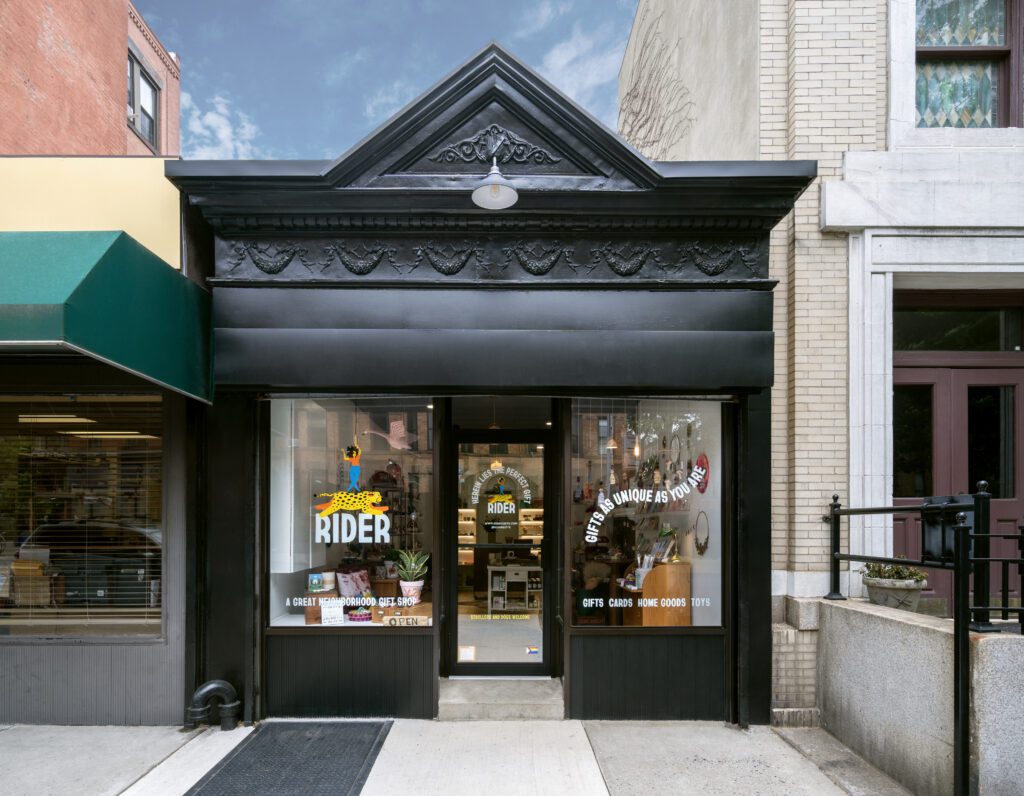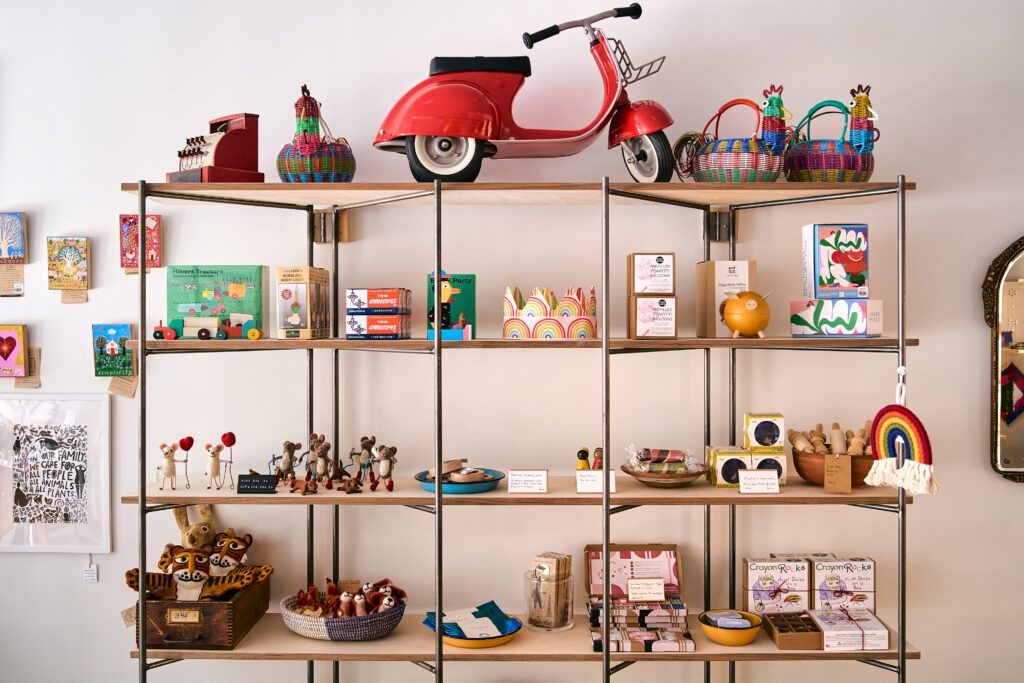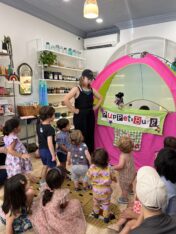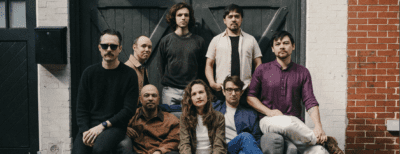Photo by Chris Coe
Community, family and the spirituality of giving in a former laundromat
At Rider in Park Slope, a new kind of home goods store makes a space for artists, kids and dogs

Photo by Chris Coe
It is a recent Sunday morning in Park Slope, and a handful of families have gathered around a small stage in a converted laundromat on Eighth Avenue. A vintage clock hangs on the wall, wood furniture plays against blue kitchen-style tile. As parents sway their kids in their laps, a puppeteer makes a rooster walk across a tightrope made of bandanas. A dachshund walks up to a crawling, giggling baby to give puppy kisses while both dog and human parents laugh.
“I’m really happy this place exists. A kid’s consignment [store] just closed, and a toy store has closed … and I assume it’s because the cost of rent is so high,” says Natalia Hirth, who came with her child and lives nearby in the neighborhood. Amid a neighborhood of restaurants and bars, she adds, bouncing her kid on her hip, “I’m really glad this place is here, and I hope it stays here.”
You would be forgiven for not realizing this is all taking place in a retail gift and home goods shop. That’s exactly what owner Alma Lacour has in mind.
Rider, a gift and home goods store that opened in November 2022, is on a quiet stretch of the avenue at 11th Street, an area with fewer retail stores, which might usually be a tough location for a business to weather. But for Lacour, this residential location was part of the appeal: In the aftermath of the loss of her mother, the onset of a pandemic and a desire for a life change, the store grew from a community-minded and almost philosophical impulse.
In response, Lacour says, local shoppers seem to have instinctively used Rider as more than a retail space, confiding in Lacour about their families, recent celebrations, and deaths, turning the store into a public living room of sorts. “Gifting is a really interesting filter through which to meet someone, because people usually come in with some very specific person in mind, or some very specific occasion in mind,” says Lacour, adding, “The space is really intimate, and I’m usually there alone. I sort of am one of those people that for whatever reason people talk to very naturally, people tell me a lot of things.”
Local jeweler Nogah Rotstein, owner of Tilly Doro, who sells her pieces at Rider, has likewise come under Lacour’s spell. “When Rider opened, there was no place like it in the neighborhood. … There was none of the pretentious attitude that some shop owners have. She is personable and warm and truly supportive in a rare and wonderful way,” Rotstein says.
While the stuff Lacour sells is typical fare like jewelry, home goods, soaps, toys and stationary, the space is also turning out to offer more in the way of new artist-centric and family-friendly events, like an artist breakfast and family portraits and puppet shows that began in May of this year.
Shooting from the hip
And yet, Lacour never set out to own a retail space. Lacour, who has lived in Park Slope for the past five years and is raising her son there with her husband, previously worked with artists and crafted immersive experiences mainly for brands; a Spotify event focused on Lauryn Hill, an HBO promotion of season 6 of “Game of Thrones,” and her State Farm promotion in California that included a 20-foot tall head of James Harden, into which you could walk and play an interactive game.
Just as she was building up her latest iteration of her career and forming it into a full, New York-based production company (a collective called Studio RIDER) which was to create a constant flow of large events for brands and spaces like galleries and cultural institutions, the pandemic intervened, as it did for so many. The pandemic and local regulations restricted how many people could gather in one place for most of 2020, even temporarily shutting down live theater on Broadway, making all big, live events generally impossible. “Because we were focusing on experiential, public spaces, my company was sort of the first on the chopping block,” says Lacour.
With her career on pause and much of her time taken up by her young son, Oscar, Lacour would go on walks. On one of those strolls, she found her local dry cleaner suddenly shuttered for good.
“I sort of shot by the hip a little bit and pitched [the building owner] on this concept of this hybrid community space and retail space,” says Lacour. Part of the pitch was the very situation that brought her there: her history, her cares as a local mom. “The landlord was really keen on having something that was local, homegrown, that wasn’t going to be a competitor to the other local businesses,” Lacour adds.
The plan moved quickly, and not without a heavy dose of philosophy. The name Rider, (taken from her stymied production company attempt) itself is meant to reference someone who “rides the waves” of life, and her shop focuses on handmade goods for both sustainability and philosophical reasons.
“I think objects are alive,” says Lacour, “and that handmade items specifically have so much life and care and craftsmanship that’s been poured into them. I think when you hold or you receive an object that has that level of quality and care put into it … you can feel the difference because it has so much humanity and soul packed into it.”
That soul can be found all over Rider, which Lacour opened in the wake of her mother’s death from cancer, while going through her mother’s objects and estate. The entire space is decked out in her mother’s things as permanent decor, from a roll-top desk to the wooden clock and mirrors that often catch visitors’ eyes.
”I have a lot of her objects in the store. She was very aesthetically minded,” says Lacour, noting that she was a collector of beautiful vintage objects and built sacred spaces, like altars, around the home. Lacour wants to use the decor and communal events to “make it feel as though it were a home, but also to, you know, pay homage to her and bring her into the space, because this is kind of the biggest adventure I’ve taken without her being here.”


Photo by Chris Coe
The spirituality of giving
Profits from sales are recycled back into the store, supporting free and ticketed programs. While Rider sells handmade items as it is, her Park Slope Made event took this further via a trunk show, allowing multiple local artists to showcase and sell their items on consignment at the store, often selling in a shop for the first time.
As part of Lacour’s hyperlocal focus, she hosted an artist’s breakfast meet and greet, helping many make local connections (some artists, she says, discovered they lived in the same building.) The last iteration of this in August showcased 30 artists selling ceramics, jewelry, art and crafts, a concept that will return to the shop again (makers and wanna-be vendors can contact her shop for details). Lacour says she does her best to keep the store stocked with locally or sustainably made goods, by businesses owned or run by women, people of color and the LGBTQ+ community.
Rotstein had already sold her jewelry at Rider when she participated in the social aspect of Park Slope Made. “There was a sense of excitement and even giddiness for those who were seeing their creations in a retail space for the first time, says Rotstein. “The relationships [Lacour has] made with the makers are genuine and not merely transactional. It’s such a nice feeling especially these days, when so much of the shopping experience takes place online. It’s definitely different from many of the other shops I work with where I just ship over my pieces but know very little about the person behind the counter. … I hope [Rider] can serve as a model for other community establishments.”


Puppetsburg
With fall and Halloween approaching, Lacour is planning a series of autumnal and Halloween-related events (“think pumpkin decorating,” she says), and will participate in trick-or-treating on Halloween. A series of fall-themed classes (to be announced on Rider’s website) will be a mix of paid and free for families and adults alike. She also plans to host a new ”Gathering Series” of meetup events for parents and creatives in the area. Providing the space for puppet shows (which ticketed and run by local group Puppetsburg on the first Sunday of each month), and the free events are another way she intends, in a very Park Slope-esque fashion, to give back.
The store has, in many ways, allowed her to lean into her skills as an “immersive experience” expert, but more oriented toward toddlers, creatives and the philosophy of “the gift” rather than a brand.
“I really resonate deeply with almost the ‘spirituality’ of gifting,” says Lacour, “It’s such an intimate and personal opportunity to express something to someone, and not everyone can do that through words or written language. [Gifting] has its own story and life built into it, and makes the gift that much more meaningful.”
You might also like 


























